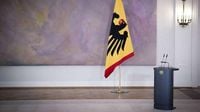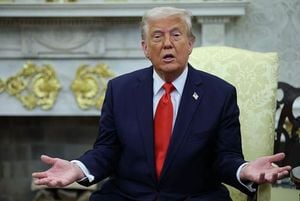Germany is on the brink of a historic change as both the Union and the SPD have expressed their agreement on the need for a female Federal President for the first time in the country’s history. This consensus comes as voices from both political factions indicate that it is time for a woman to take on this prestigious role, particularly with the next election set for early 2027.
Currently, the office of the Federal President has been held exclusively by men, with twelve individuals occupying the position since the establishment of the Federal Republic of Germany. However, recent statements from prominent politicians suggest a shift in perspective. "It is certainly time for a woman in this office, which would send a strong signal for equality in our country," remarked Alexander Schweitzer, the Minister-President of Rhineland-Palatinate and a member of the SPD, in an interview with the Tagesspiegel.
Schweitzer emphasized that Germany has consistently succeeded in electing outstanding personalities to its highest state office from the broad democratic center. He expressed optimism that this tradition will continue with the upcoming succession of Federal President Frank-Walter Steinmeier, who is ineligible to run again after serving two terms.
Maria Noichl, the chairwoman of the women’s section of the SPD, echoed these sentiments, stating, "After twelve men, a woman is certainly not too early. As one of over 50 percent of women in the population, I want to be represented as a woman." Noichl highlighted the importance of representation in leadership roles, advocating for a woman to be elected to the highest office in the land.
The call for a female Federal President is not limited to the SPD. Ulrike Scharf, chairwoman of the Women’s Union of the CSU and also the Bavarian Minister for Family, Labor, and Social Affairs, affirmed that "Germany is ready for a female Federal President." She noted that women are essential to modern, value-based, and responsible politics, asserting, "For me, it is clear: all politics is women’s politics! Therefore, yes: a woman can also be our head of state."
Mareike Wulf, chairwoman of the Women’s Union of Lower Saxony, highlighted the symbolic significance of electing a woman to this role. She stated, "It would be an extremely important signal if this office, with its enormous symbolic power, were to be filled by a woman for the first time. It is time for this to happen." Wulf called on the political parties to propose bold and forward-looking candidates for the presidency, emphasizing that there are many qualified women in Germany who can meet the requirements of the office.
Support for the push for a female president is also coming from Berlin's Senator for Women and Equal Opportunities, Cansel Kiziltepe (SPD). Kiziltepe pointed out that the office of Federal President has been exclusively held by men since the inception of the Federal Republic, stating, "This one-sided occupation does not reflect the diversity and competence that women bring to our society." She argued that the demand for a female president is not merely a symbolic act but a necessary step towards genuine equality and representation.
The next regular election of the German head of state is scheduled for early 2027. The Federal Assembly, which will conduct the election, is composed of all 630 members of the Bundestag and an equal number of representatives from the 16 state parliaments. However, the majority ratios within the Federal Assembly are yet to be finalized. Before the assembly convenes in 2027, several federal states, including Baden-Württemberg, Mecklenburg-Vorpommern, Rhineland-Palatinate, and Saxony-Anhalt, will hold elections for their state parliaments in 2026. Berlin will also re-elect its House of Representatives that same year.
As the political landscape evolves, the push for a female Federal President reflects broader societal changes regarding gender equality in leadership roles. With over half of the population being women, the call for representation at the highest levels of government is becoming increasingly hard to ignore. The upcoming election will not only determine the next head of state but may also set a precedent for future generations regarding gender representation in politics.
The anticipation surrounding the potential election of a woman to this office is palpable, as both the Union and SPD rally behind the idea. As Ulrike Scharf aptly put it, "Women are the lifeblood of modern, values-based, and responsible politics." The time for change is now, and the prospect of a female Federal President is a significant stride towards achieving equality in Germany.
With the next election on the horizon, the political parties are expected to put forth candidates who not only meet the qualifications but also resonate with the public's desire for representation and inclusivity. The road ahead may be challenging, but the momentum for a female Federal President is growing stronger by the day.





